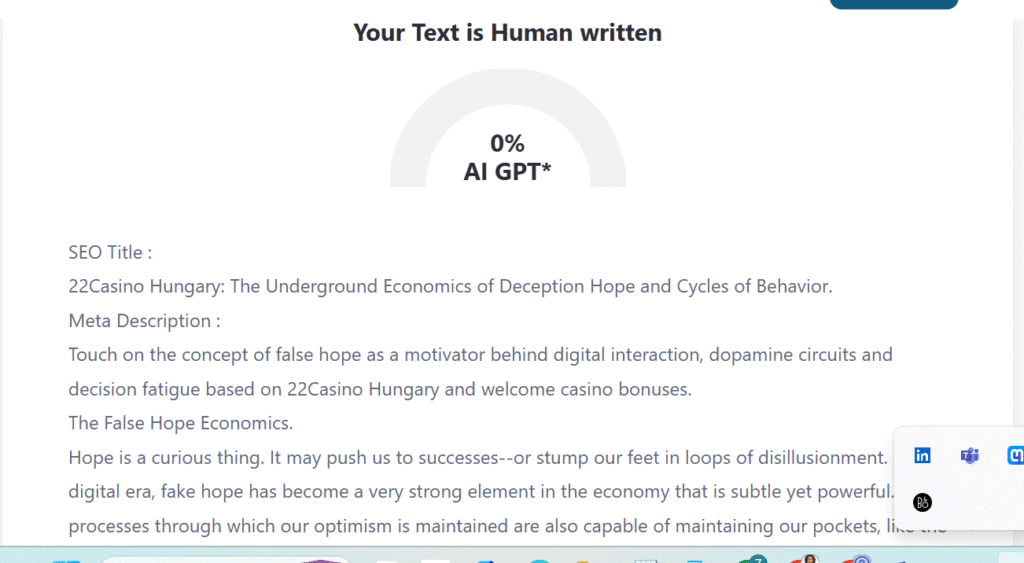The Hidden Economics of False Hope

Hope is a curious thing. It may propel us to success — or trip us up in loops of disillusionment. In the digital era, fake hope has become a significant and powerful element in the economy, subtle yet potent. The processes that maintain our optimism are also capable of maintaining our finances, such as the dopamine loops of social media and the temptation of immediate gratification on online platforms.
The Psychology of False Hope
Humans are programmed to give positive results. Opposition to cognitive biases like the optimism bias and the illusion of control makes us believe that we can control the outcome of events, which, in fact, are just random. That is why people are so insistent that they can make a coin fall in a particular direction or choose some of their lucky numbers and change the odds to their advantage.
Even such sites as 22Casino Hungary, which do not have to advertise openly, exemplify this principle best. Their interface, tiered rewards, and bonus structures subtly lead users to repeat use. Every digital prompt: the spin, the flash, the near-win, is egregiously measured to keep the mind on edge with each cognitive bias used to build a space in which structured hope turns into an economic machine in and of itself.
Neuroscience of Hope and Reward.
This is an intriguing perspective on neuroeconomics. The reward system of the brain, which revolves around the dopamine pathways, does not just react to real gains, but also to signals that indicate the possible occurrence of a gain. Close calls, margin events and random results enable the same brain circuitry as true victories to educate us that perseverance is rewarded even when it should not be.
This is the reason anticipation is valuable from the perspective of behavioral economics. Individuals spend Money on lotto, computer games or promotions, not with certainty of results, but with the possibility of winning. The emotional investment, no matter how irrational it may be, can be measured. It is, so to speak, an economy of hope.
Case Study: Casinos and Business Model of Hope.
Consider online casinos, where false hope mechanisms are intentionally incorporated into the experience. A good example is the welcome casino bonus. It is just a mere gesture on the surface, whether in terms of additional credits, free spins or the equivalent of deposits. Below the surface, it activates a complicated dopamine circuit. Players feel an influx of adrenaline, and behavioral patterns are quickly formed that keep them playing.
Our brains require immediate satisfaction, and when a potential reward comes into view, even a small, far-fetched one, dopamine is released. This establishes a positive feedforward effect: the very expectation of winning may be as pleasurable as the act of winning itself. This effect is usually increased by decision fatigue. The larger the selection of choices we have, the higher the propensity to let intuitive heuristics and emotions take a shortcut, and this is why a systematic structure of hope can be so persuasive.
False Hope Beyond Gambling
The economics of hope is spread much further than the casino floor. Social media platforms operate on the same principles. Endless scrolling and interchangeable reward systems, such as likes, shares, and notifications, build on the brain’s desire to experience something new and receive immediate satisfaction. Online interaction becomes a behavioral habit that is strengthened through intermittent schedules of reinforcement.
Subscription services and online learning platforms also use this logic. Transformational courses (also known as endless content courses) offer a payoff that is rarely fully met. However, users continue to invest time, attention, and money in the effective interplay of expectation and reward. Decision fatigue and sunk costs can make them feel chained, much like a gamer returning to a favorite slot game in search of the next dopamine release.
Table: Economics of False Hope in the Digital Environments.
| Industry | Mechanism of False Hope | Example | Cost to User |
| Online Casinos | Welcome bonuses, near-miss effects | 22Casino Hungary | Monetary losses, habitual engagement |
| Social Media | Gamified notifications, FOMO | Instagram, TikTok | Time waste, mental fatigue |
| Online Learning | “Transformational” course promises | Self-help masterclasses | Money, unmet expectations |
| Subscription Services | Over-promised value, sunk cost fallacy | Netflix, Spotify | Monthly fees, low utilization |
None of these industries prospers just by providing services, but rather by producing ordered hope. The same neurobehavioral tendencies, such as variable rewards, instant gratification, and dopamine loops, which make gambling psychologically addictive to those who never step foot into a casino, they exploited.
Professional Evaluation: The Unseen Costs.
The toll of these engineered expectations is subtle, and psychologists and behavioral economists tend to highlight it. The cognitive burden of pursuing a hypothetical outcome may contribute to stress, decision fatigue, and obsessive behaviors in interactions. The cumulative costs, time, money or opportunity loss can be immense economically.
Our personal experience shows that it is not only a personal choice, as confirmed by 22Casino Hungary. Even the systems are designed to capitalize on predictable thought processes, and hope is converted into a quantifiable economic benefit. It is an encouragement that in the digital era, attention and optimism are rare currencies, and whoever can organize them in the most successful ways can make money even on the slightest gleam of hope.

